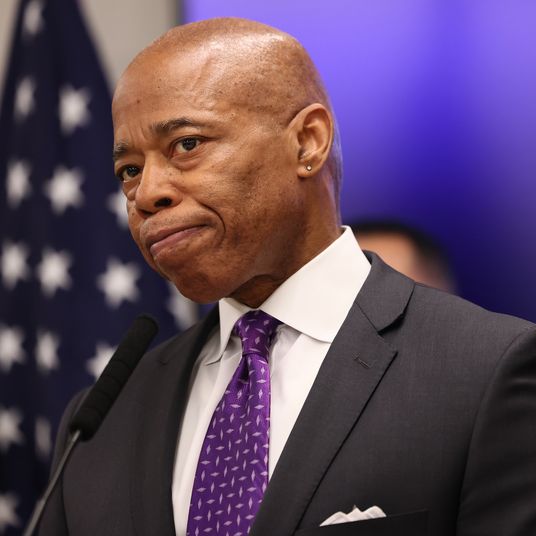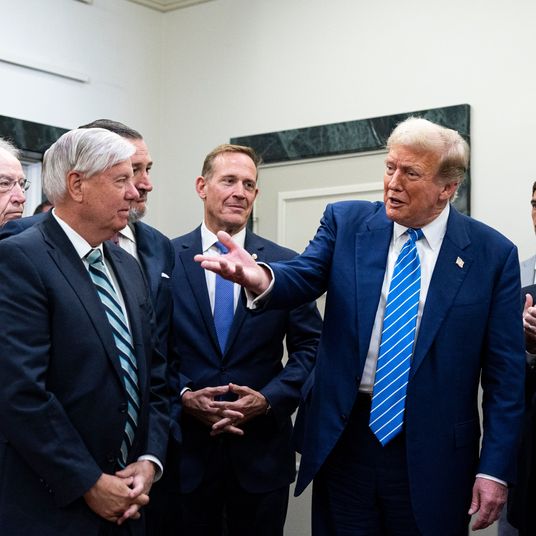
At 4:46 a.m. on Friday, the Senate passed a measure that sets out a blueprint for the first stage of Donald Trump’s legislative agenda, unlocking the mythical powers of a “budget reconciliation” bill that Democrats can’t stop. Republicans who control the chamber must be swelling with pride, don’t you think?
Probably not. The vote followed a very long and difficult week in Congress. Days earlier, Trump blew up over a month of work by the Budget Committee under Lindsey Graham, aimed at giving the president a “quick win” by authorizing an initial reconciliation bill to spend money on the border and defense and canceling some of the Biden-era “green energy” programs, while leaving taxes and the budget cuts needed to pay for them to a second bill later in the year. The House has separately pursued a single reconciliation-bill strategy with everything in it, and Republicans in both chambers have been begging for Trump to tell them which approach he wants. He finally did in a Truth Social post endorsing the House’s strategy, but the White House didn’t let its Senate allies off the hook. A few hours after Trump’s bombshell (which, to use a technical term, was a dick move), J.D. Vance instructed Senate Republicans to go ahead and pass their apparently useless budget resolution to provide a Plan B in case things fell apart over in the House.
So Senate Republicans dutifully put the resolution on the floor and prepared for the torment of what is called a “vote-a-rama,” a peculiar part of the budget process that requires ten hours of votes on unlimited amendments, most of them Democratic “messaging” votes that forced GOP senators to go on record against insulating programs like Medicare and Medicaid from budget cuts.
So the lawmakers had to stay up all night voting down protections for wildly popular federal programs quite possibly for nothing.
If the House does pass a budget resolution, the Senate will have to take that up and go through another vote-a-rama. And all this, mind you, is just the beginning of the congressional budget process. After the House and Senate finally agree on a blueprint, they will have to enact one (if the House has its way) or two (if the Senate’s Plan B becomes the plan) bills actually implementing the blueprint. Meanwhile, Republicans in both chambers are already having to defend the chaos Elon Musk and his DOGE minions are generating throughout the federal bureaucracy — an especially grim task given the reality that Musk is usurping congressional prerogatives with every action he takes.
But the headaches Republican senators are experiencing are mild in comparison to the troubles facing Mike Johnson. Getting agreement on the basic framework of the “one big beautiful bill” without losing more than a single House Republican (all he can afford at present) is really a challenge. Given the size and scope of the tax cuts Trump is demanding, the search for offsetting budget cuts that don’t contradict White House priorities is going to be excruciating.
A particular source of agony is what to do about the one major entitlement program most Republicans would love to gut, Medicaid, the federal-state health-insurance program for (mostly) low-income families. Right now, the House resolution that’s in draft form assumes big, big Medicaid cuts, of a level that a major “reform” like a per capita cap on federal spending (which was included in the failed 2017 bill principally aimed at repealing the Affordable Care Act) or a block grant to the states might be required. But as with the Senate’s budget resolution, Trump himself is making things difficult for his House allies. In an interview with Sean Hannity that aired on Tuesday, Trump casually included Medicaid along with Medicare as off-limits to budget-cutting: “Medicare, Medicaid — none of that stuff is going to be touched.”
There’s no hard evidence that Johnson fainted when he heard this remark, but it couldn’t have made him happy. For now, he’s at least pretending to comply with a huge caveat, as the Hill reported:
“Look, Medicaid has never been on the chopping block,” Johnson said during a press conference. “If you eliminate fraud, waste, and abuse in Medicaid, you’ve got a huge amount of money that you can spend on real priorities for the country.”
One person’s “waste, fraud, and abuse” is another’s “essential benefits,” so this reassurance isn’t particularly firm. It’s also worth remembering that Trump promised not to cut Medicaid before he endorsed the legislation that did just that in 2017. Technically, that bill didn’t cut benefits either: By limiting federal responsibility for the program, it put the states that actually run it in the position of executing the benefit cuts needed to generate the required savings. We might see that kind of trick again.
So the chaos the Senate experienced this week is continuing in the House as Republicans in Congress look nervously at what DOGE is doing while looking down the long road to the end of the year. They are also running out of time to avoid a government shutdown. Perhaps those GOP lawmakers who retired this year or found a gig in the Trump administration had the right idea.





























